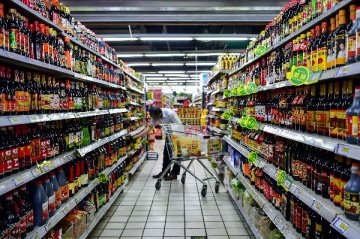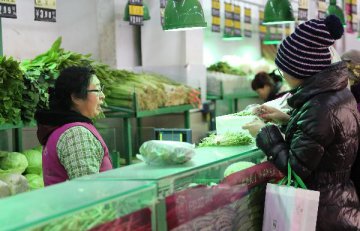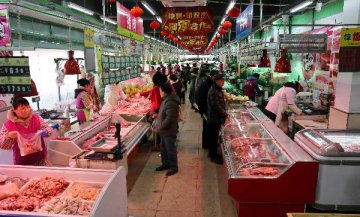
Inflation has been kept low since this year. Although data about consumer price index (CPI) of November and December hasn’t been released yet, industry insiders won’t think CPI will grow by more than 2 percent for the whole year. As food prices may increase slightly and OPEC reducing oil production will lead to rise in price of crude oil and industrial products, institutions forecast that there’s pressure for inflation to climb, but it will move up mildly on the whole.
The year-on-year growth in CPI stays low this year. Except that it surged by 2.5 percent year on year in January due to seasonal factor, it saw a growth ranging from 1 percent to 2 percent for 9 consecutive months since February. It has accumulatively grown by 1.5 percent from a year earlier in the first 10 months of this year, hitting a new low in recent years.
Declining prices of vegetables and pork were believed to be a reason for the low CPI this year. There’s huge difference in component of CPI. Consumer price of non-food is quite low. Producer price index (PPI) failed to influence downstream industries, while service price went up remarkably. Though oil price performed strongly, it accounted less in CPI in China. Therefore, its influence of boosting CPI is very limited.
High-frequency data showed that prices of edible agricultural products have seen stable growth since November. Vegetable prices dropped slightly, and meat prices witnessed the same decline with the previous month.
Many institutions thought that the year-on-year growth of CPI will slow down slightly in November. Bank of Communications, Haitong Securities, Huatai Securities, Huachuang Securities, Shenwan Hongyuan Securities, Northeast Securities and others predicted a 1.8 percent of CPI growth. Industrial Bank and Merchants Securities predicted the growth to be 1.6 percent and 2 percent, which is the lowest and the highest growth, respectively.
They had the same idea on the trend of CPI for the whole year. Lian Ping, chief economist of Bank of Communications, said that the year-on-year CPI growth stood at 1.5 percent during January and October, hitting a new low in recent years. He forecasted it won’t change a lot and grow by less than 2 percent in December. Based on this, the CPI will increase by around 1.5 percent in 2017, placing gentle pressure on inflation.
Industry insiders fear there will be some influential factors like food prices and transmission of price of industrial products in 2018. Pressure for inflation will strengthen, they predicted.
The first factor is food prices. The low CPI this year was mainly dragged down by food prices. They gradually kept stably over last several years after dropping for nearly one year. Pork price began to get stabilized. In addition, supply of pigs is decreasing, which will push up pork price in next year. Therefore, food prices are likely to move up slightly in 2018, which won’t be unfavorable to inflation. Besides, OPEC reducing oil production will lead to rise in price of crude oil and industrial products
According to Li Chao, chief researcher from Huatai Securities, stated that pork price will continue to drop at a slower pace in the first half of 2018 and may enjoy positive growth in mid-2018. It is less likely for pork price to rise significantly without regard to some emergencies like epidemic diseases of pigs. Oil price may increase first and then drop in next year. The highest growth and the average growth of oil price on a yearly basis will be lower than those of this year. It is difficult for oil price and pork price to jointly affect inflation. It is expected that CPI will climb mildly by 2.5 percent in 2018.
Lian Ping predicted that based on the low comparison base this year, the CPI might surge in 2018. But under the background with stable demand and supply and tightening monetary environment, there won’t be great inflation pressure. He thought CPI will hike by around 2 percent year on year in 2018.
Jiang Chao, chief economist of Haitong Securities, forecasted a slightly growth for CPI in 2018, which is a little higher than that of this year. The CPI growth may see a peak in March of next year but will decrease gradually after that on the whole.
Translated by Vanessa Chen






















Latest comments